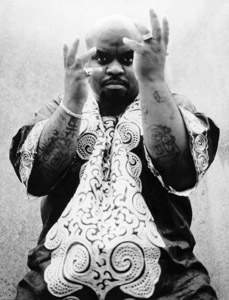![[Metroactive Music]](/music/gifs/music468.gif)
[ Music Index | Silicon Valley | Metroactive Home | Archives ]
Photograph by Dean Karr
Song of the South
Dungeon Family member Cee-Lo admires ABC, lives to tell about it
By Todd Inoue
ON THE PHONE from his home base of Atlanta, Ga., Cee-Lo looks over at his CD rack and starts listing artists that are in his heavy rotation. He name checks everything from the Wailers to G-Dep to Local H to the Velvet Underground. But at his core, he's just an '80s kid. He was a hair-band fanatic: Poison, Mötley Crüe, Billy Idol and Quiet Riot. The first record he owned was ABC's "The Look of Love."
"My sister bought me that for a birthday present," he remembers fondly. "I loved that song. I used to sing that song and 'Poison Arrow' and 'When Smokey Sings.' I'm very familiar with ABC."
To punctuate the point, Cee-Lo sings the chorus of "Poison Arrow" into the receiver. I'm flabbergasted. Who knew that this hulk of a man and member of Southern hip-hop royalty the Goodie Mob and the Dungeon Family had a soft spot for fey British soul man Martin Fry?
"Hip-hop wasn't as prevalent back then," he explains. "Luckily, I was raised in a colorblind area, very unbiased. I used to love the Rolling Stones' 'Miss You.' I just identified with the soul and feel of the song. I just like what I liked."
This diversity in music appreciation is explored on his album Cee-Lo Green and His Perfect Imperfections. The rapper and singer with the hawklike squall draws upon his myriad of influences, which range from funk, soul and hip-hop to rock and blues. He explores the good and bad of life, balancing uplifting tales with boastful platitudes.
"I am so open and considerate to people listening to music, I could not segregate my music for one audience," he says. "I naturally cannot do it. My music is this grand spectacle of style, expression and individuality, but it's grandly humble also. I let people know that I am them."
In 1995, the Goodie Mob released Soul Food, which, along with Outkast's 1994 album, Southernplayalisticadillacmuzik, ushered in a new era of Southern hip-hop, one steeped in soul, bass music, R&B and gospel. The two groups began reconfiguring people's images of Southern music.
"I was positioned for one main thing with Goodie Mob, and that was to establish respect for the South," he says. "That's why we were so dead serious and spoke so sternly and urgently about pride and self, respect and empowerment, because it was long overdue that the South be recognized as a force to be reckoned with."
After the 1999 Goodie Mob album, World Party, hinted at and confirmed a creative split, Green went his own way. He began to fully explore his musical loves. He appeared on Carlos Santana's Supernatural album on a track with Lauryn Hill called "Do You Like the Way." Another collaboration with Santana, "Lady Bird Blues," will appear on the guitarist's next solo album.
A single from Perfect Imperfections, "Live Right Now," is indicative of Cee-Lo's new philosophy. The "bounce," so key in Outkast and Goodie Mob songs, gets ample thrust in "Closet Freak," "Big Ole Words" and "Bad Mutha." He breaks it down for the lyric fans on "One for the Road" and invites us into the mental boudoir on "Spend the Night in Your Mind." "Young Man" is the showstopper--a 3am reality check for the next generation.
I give Cee-Lo the choice of freestyling like KRS-One, playing guitar like Eddie Van Halen or singing like Luther Vandross. He considers the options carefully before settling on the last.
"I'd probably sing, just because singing is more close to my soul," he says. "It's a lot more closer place for me to be and a much more comfortable emotion for me to entertain. All of the different subjects and situations I'd like to address--the situations are better sung. You can rap certain things, but sometimes rap is limiting."
[ Silicon Valley | Metroactive Home | Archives ]
Copyright © Metro Publishing Inc. Metroactive is affiliated with the Boulevards Network.
For more information about the San Jose/Silicon Valley area, visit sanjose.com.
![]()
 Rebel Yell: Cee-Lo Green strikes a pose.
Rebel Yell: Cee-Lo Green strikes a pose.
Cee-Lo opens the Smokin' Grooves Tour (with Outkast, Lauryn Hill, The Roots, Jurassic Five and Truth Hurts) at 6pm on Thursday (July 18) at the Shoreline Amphitheatre, 1 Amphitheatre Parkway, Mountain View. Tickets are $26.25-$50.25. (408.998.TIXS)
Send a letter to the editor about this story
.
From the July 11-17, 2002 issue of Metro, Silicon Valley's Weekly Newspaper.